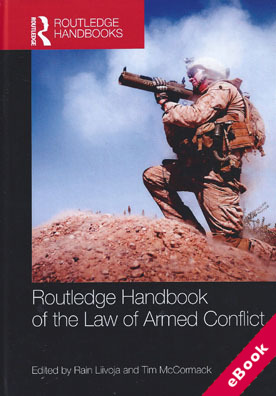
The device(s) you use to access the eBook content must be authorized with an Adobe ID before you download the product otherwise it will fail to register correctly.
For further information see https://www.wildy.com/ebook-formats
Once the order is confirmed an automated e-mail will be sent to you to allow you to download the eBook.
All eBooks are supplied firm sale and cannot be returned. If you believe there is a fault with your eBook then contact us on ebooks@wildy.com and we will help in resolving the issue. This does not affect your statutory rights.
The law of armed conflict is a key element of the global legal order yet it is recognised that this branch of law is often honoured more in the breach than in the observance.
The Routledge Handbook of the Law of Armed Conflict provides a unique perspective on the field covering all the key aspects of the law as well as identifying developing and often contentious areas of interest driven by the changes in the nature of warfare. The handbook will feature original pieces by international experts in the field, including academics, staff of relevant NGOs and former members of the armed forces.
Made up of six parts in order to offer a comprehensive overview of the field, the structure of the handbooks is as follows: Part 1: Basics Part 2: Principles of distinction Part 3: Means and method of warfare Part 4: Specially protected persons and objects Part 5: Contemporary issues Part 6: Enforcement Throughout the book attention is paid to non-international conflicts as well as international conflicts with acknowledgement of the differences. The contributors also consider the relationship between the law of armed conflict and human rights law, looking at how the various rules and principles of human rights law interact with specific rules and principles of international humanitarian law in particular circumstances.
The Routledge Handbook of the Law of Armed Conflict provides a fresh take on the contemporary laws of war and is written for advanced level students, academics, researchers, NGOs and policy-makers with an interest in the field.